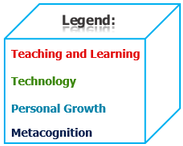ETEC 521
Indigeneity, Technology, and Education

"In whatever we do, we must support learners."
I had such high hopes for this course! Being Métis myself, and having taught both children and adults on/ from an Aboriginal reserve, I was hoping this would be the professional development I was looking for! In the past, I have always found professional development in this area to be lacking in breadth, depth, content, and applicability. I often come out of these sessions feeling that I learned nothing new. In one way, this course fell into that category again, but in two ways, my capacity in the area of Aboriginal learners was enhanced and extended.
|
Where it fell into my existing experience: I came out with more questions than answers; feeling ineffectual, hypocritical, and just as lost on how to provide appropriate education to these unique learners.
More on Knowing Less
|
Where it exceeded expectation: first, I gleaned some very salient themes applicable to a broad range of Aboriginal groups. This increased my understanding of how Western values are conflicted with Aboriginal ones. This altered my foundational knowledge of Aboriginal learners. Second, this course shook my understanding of my own family! So many of the themes I drew out were directly applicable and even visible in my own family.
More on Aboriginal Learners and Technology
|
As far as technology is concerned, this course had a weblog aspect, where participants were to keep a blog of useful, pertinent, or useful resources on Aboriginal content; from teaching/ learning resources to relevant background, and beyond. This activity began and ended with the posting of these blogs. There was no additional interaction or use of this part of the course. As such, I really didn’t read what anyone else posted, nor did anyone read mine. It was an exercise in yelling into a void.
More on Conditions of Assessment
Aboriginal Content Teaching Resource
|
This was one of two times where I have felt that for all I know now, I now know less than I did before. I had a vision of a very concrete, usable, and directly applicable orientation for educators plus an assortment of resources to support educators in bringing Aboriginal- friendly perspectives and pedagogy into the classroom. What I found was that this just can’t be done. There is no “right” answer. As a result, I shifted my goal to providing a few foundational concepts, illustrated through quality multimedia resources that would provide a beginning place for educators to then expand upon. I did still provide a selection of resources, again as a starting place, which mostly came from my own weblog and those of my classmates, so that was a nice connection to that portion of the course.
|
More on Knowing Less II
More on the Use of Technology and Intentions
|
Where to Next?
Refernences:
Therien, J. (2016). The metaphorical journey into indigenous knowledge. Website. University of British Columbia.
Audio Clip References:
Indigenous and Northern Affairs Canada. (2010). Fact sheet- Urban Aboriginal population in Canada. Retrieved from www.aadnc-aandc.gc.ca/eng/1100100014298/1100100014302
Jenkins, H. (2009). Confronting the challenges of participatory culture: Media Education for the 21st century. Cambridge, MA: MIT Press. Retrieved from https://mitpress.mit.edu/sites/default/files/titles/free_download/9780262513623_Confronting_t he_Challenges.pdf
New London Group. (1996). A pedagogy of multiliteracies: Designing social futures. Harvard Educational Review. 66(1), 60-92.
Therien, J. (2015). Keyword post 1: Literacy Pedagogy. ETEC 510 Unpublished manuscript. University of British Columbia
Therien, J. (2016). The metaphorical journey into indigenous knowledge. Website. University of British Columbia.
Audio Clip References:
Indigenous and Northern Affairs Canada. (2010). Fact sheet- Urban Aboriginal population in Canada. Retrieved from www.aadnc-aandc.gc.ca/eng/1100100014298/1100100014302
Jenkins, H. (2009). Confronting the challenges of participatory culture: Media Education for the 21st century. Cambridge, MA: MIT Press. Retrieved from https://mitpress.mit.edu/sites/default/files/titles/free_download/9780262513623_Confronting_t he_Challenges.pdf
New London Group. (1996). A pedagogy of multiliteracies: Designing social futures. Harvard Educational Review. 66(1), 60-92.
Therien, J. (2015). Keyword post 1: Literacy Pedagogy. ETEC 510 Unpublished manuscript. University of British Columbia
